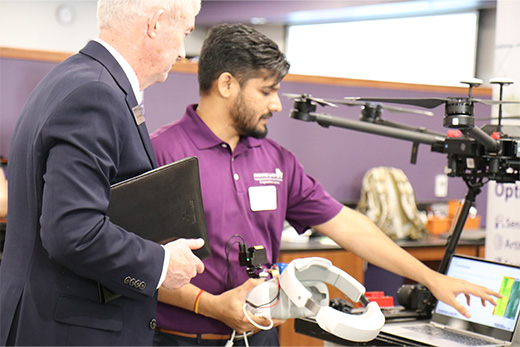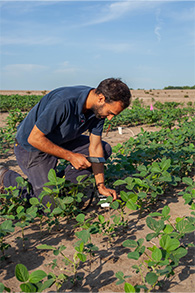K-State launches next-gen Institute for Digital Agriculture and Advanced Analytics
Friday, Sept. 22, 2023

Kansas State University is launching the interdisciplinary Institute for Digital Agriculture and Advanced Analytics, a people-centered collective transforming learning, research and outreach around digital technologies and advanced analytical methods. | Download this photo.
MANHATTAN — Kansas State University is setting the stage as a national leader in digital agriculture with the launch of the interdisciplinary Institute for Digital Agriculture and Advanced Analytics.
The institute is a people-centered interdisciplinary collective transforming learning, research and outreach around digital technologies and advanced analytical methods to enhance agricultural, environmental and socioeconomic decision making.
Work done at the institute will include developing and integrating analytical methods and digital technologies — like sensors, automation and robots — that enhance food production and inform decision making for sustainable and resilient systems.
"A next-generation land-grant university is an innovative university, and that's exactly what we're doing with our new Institute for Digital Agriculture and Advanced Analytics," said K-State President Richard Linton. "Through this new institute, Kansas State University is working across disciplines to solve global agricultural problems and build the economic prosperity of Kansas and one of our state's key industries."
Harnessing expertise from the College of Agriculture, the College of Arts and Sciences, the College of Education, the Carl R. Ice College of Engineering, Kansas State University Salina Aerospace and Technology Campus, and K-State Research and Extension, the institute will advance research and learning in the digital agriculture and advanced analytics realm.
The institute's core administrative team consists of Ignacio Ciampitti, professor of agronomy; Brian McCornack, professor and department head of entomology; Ajay Sharda, professor of biological and agricultural engineering; Trevor Hefley, associate professor of statistics; Shawn Hutchinson, professor of geography and geospatial sciences; Pascal Hitzler, professor of computer science and director of the center for artificial intelligence and data science; and Susan Metzger, director of both the Kansas Center for Agricultural Resources and the Environment and the Kansas Water Resources Institute.
"The interdisciplinary structure of the institute will give faculty and students the opportunity to experience firsthand how professionals in different disciplines approach and solve problems," said Hutchinson. "These perspectives and deep technological expertise will enrich agricultural research and outreach efforts and strengthen degree programs, producing our next-generation agricultural practitioners, researchers and policymakers."
The innovation of the institute won't be isolated to just the university; in fact, public-private partnerships with industry experts and collaboration with Kansas communities are key components of the institute's success.
"The goal is to expand our digital footprint to rural communities to facilitate innovative and entrepreneurial ideas with research-driven expertise as it pertains to digital ag," said Ciampitti. "Our team has faculty with K-State Research and Extension appointments facilitating the translation of our science from the research and classroom to every county in Kansas."
The institute will directly align with the interdisciplinary areas of focus outlined in the Next-Gen K-State strategic plan that comprise the K-State Opportunity Agenda: community health and well-being, sustainability, global food security and biosecurity, and enabling technologies.
"The current challenges our producers are facing and the technology innovation needed to bridge those gaps are interdisciplinary," said Sharda. "Developing technological and digital agriculture solutions that are easy to use through interdisciplinary teams that are accessible and robust is one of the foundational goals and core missions of the institute."
The culmination of this collaborative effort will ensure that K-State is positioned as a leader in digital agriculture with an effective foundation to develop programs that sustain the long-term competitiveness of agriculture in Kansas.
"Our team is ready to develop and expand the digital ag capacity at K-State to enhance the lives of Kansans, now and into the future," said Metzger. "We will not only help train the next generations of thinkers using existing university personnel and programs, but we feel this cooperation will help us prepare the new workforce for the future of our state while developing a universitywide road map on these critical topics in research, teaching and extension."
For more information about K-State's Institute for Digital Agriculture and Advanced Analytics, visit the institute's website or email id3a@k-state.edu.

